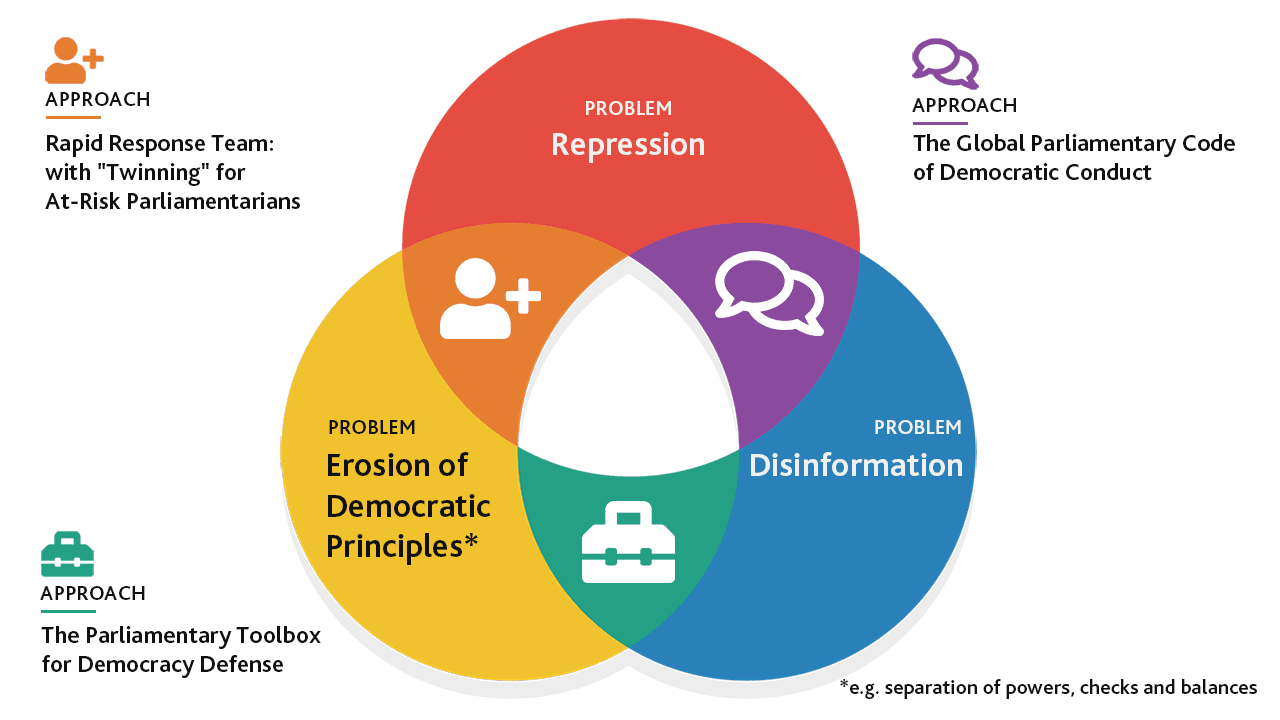***46th PGA Annual Forum and 4th Consultative Assembly of Parliamentarians for the Oceans, 26 - 27 March 2026, Mexico City. *** REGISTER HERE
The first case of the novel coronavirus in Malaysia was confirmed on January 25, 2020, although transmission in the country only became widespread following a large-scale religious gathering in late February/early March. To date, Malaysia has reported 7,059 confirmed cases and 114 deaths. The health crisis has unfolded against a background of political turmoil that has exacerbated the pandemic’s devastating effects by hindering effective governmental response. As one expert puts it, Malaysia now faces a “triple crisis” of coronavirus, economy, and politics.
National elections in 2018 brought a turnover in Malaysia’s ruling party for the first time in more than 60 years. Less than two years later, amid compounding economic pressures, political controversies, and internal rivalries, the government collapsed in February 2020. A new coalition emerged and was appointed as government by the Yang di-Pertuan Agong (king). However, the coalition was highly unstable and was criticized internally and outside the country as a “backdoor” government lacking democratic legitimacy, including several parties that voters had rejected in the May 2018 elections.
Against this backdrop, the Malaysian parliament sat for the first time this year on Monday, 18 May 2020, after the government postponed the session scheduled to begin in early March. The session was anticipated to include debate over several important motions, including additional government spending in economic stimulus packages to cushion the impact of the coronavirus, as well as a no-confidence vote against Prime Minister Muhyiddin Yassin amid mounting dissatisfaction.
However, citing the COVID-19 pandemic, Muhyiddin announced that parliament would convene for only one day with a single agenda item: an address by the king, with all but state media barred from attendance.
As prominent regional and international human rights organizations have noted, this deliberate obstruction of parliament to thwart a potential confidence vote constitutes a frontal assault on Malaysian democracy and has deprived the people of their rights to representation, legislation, and oversight at a time when they are most needed.
Parliaments are the indispensable democratic institution. Where and when their ability to realize their essential mandate is constrained, the health of democracy itself is compromised. Legislatures in democracies perform unique functions of representation, legislation, and oversight. They are the institutional mechanisms that make representative governance real on a day-to-day basis.
Is a one-day Parliament sitting with no Government agenda or motion to debate any matter that is definite, urgent and of public importance a threat to parliamentary democracy? 18 May will forever be etched in the annals of the August House as the darkest day in parliamentary democracy in Malaysia.Hon. Kasthuri Patto
PGA Executive Committee Member
Founding Member of the PGA Global
Parliamentary Rapid Response Team (PARRT)
DAP Member of Parliament for Batu Kawan
International Secretary for Wanita
COVID-19 presents both a crucible and litmus test for democracy. The pandemic has understandably limited the ability of parliaments worldwide to fulfill these vital functions. In many legislatures, the necessity to adapt has sparked innovation that may be sustained after the current health crisis has abated.
From the Maldives to Canada, parliaments – including those of many fellow Commonwealth countries – continue to meet remotely and transparently, in “virtual” view of citizens. Although these convocations can present technical challenges and can underscore inequities of access to technology, they demonstrate a genuine effort to uphold parliamentary responsibilities.
By contrast, the Malaysian government’s diminution of the parliamentary session to a single day at which no legislative business could be deliberated – even with regard to the critical issue of COVID-19 response and precautions – is an attempt to scapegoat the coronavirus for an unacceptable attempt to undermine parliamentary democracy.


Sign PGA’s Statement calling for the Malaysian Government to respect the legislature’s mandate.
Demonstrating solidarity by filing a resolution rejecting attempts to undermine the legislature.
Raising awareness through social media and public statements regarding the situation in Malaysia.
Building support by sharing this alert with your constituents and parliamentary colleagues.
Government representatives and relevant authorities must respect their human rights and rights to a fair trial and due process.
The Nicaraguan Government imprisoned Brooklyn Rivera and his parliamentary alternate Nancy Henríquez, alleging the commission of “crimes of treason, undermining the national integrity, conspiracy, and spreading false news”.
Sri Lanka, a country with over 21 million people and Asia’s oldest democracy, is facing one of its worse economic, political, and social crises in decades.
Authorities In Ethiopia Must Halt Arbitrary Arrests, Political Persecution, And Mass Killings
Gross Negligence Of Brazil’s Indigenous Population During The Covid-19 Pandemic May Amount To Genocide
In recent years, an increasing number of members of parliament, journalists, and social leaders have been repressed and jailed by the Venezuelan government based upon their convictions.
For more than 20 years, the political bipartisanship led by the Alianza Republicana Nacionalista party (ARENA) and the Farabundo Martí Front for National Liberation (FMLN) has generated significant frustrations in El Salvador
The health crisis caused by the coronavirus pandemic has unfolded against a background of political turmoil... As one expert puts it, Malaysia now faces a triple crisis of coronavirus, economy, and politics.